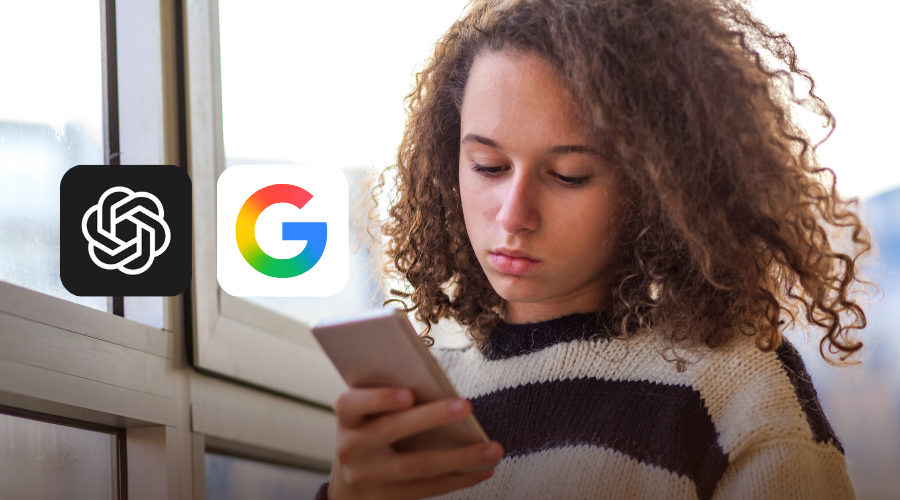Google and ChatGPT Search Insights

Google and ChatGPT Search Insights - The Unexpected Way People Use ChatGPT and Google Together
What happens when you ask people a question they don’t know the answer to, or ask them to look into purchasing an item, or ask them to plan a holiday?
Maya (pseudonym) is planning a trip to Japan. She uses ChatGPT to search and brainstorm an ideal itinerary- asking about hidden travel gems, discussing whether to focus on cities or countryside, and help plan her through the logistics of the holiday. Then she switches to Google, specifically to help her book hotels, confirm the plane schedules, and read up on reviews of restaurants and activities ChatGPT mentioned.
What have we noticed about this new style of search behaviour? She's not choosing between them. She's using both simultaneously. And according to our data, collected by over 80,000+ users on our app, she's not alone.
What Measure Protocol Discovered
We tracked over 10,000 people who use both ChatGPT and Google over the past year, to help answer our question of understanding a simple question: “When people adopt AI chat, do they search less?”
The answer? No - they search more.
The new ChatAI is not used to just answer questions, and prompts. It’s being accessories as an additional layer to help users search deeper, and holistically. Measure Protocol found out that when people used ChatGPT, they ran 189 Google searches to supplement their Chat sessions.
In months where ChatGPT usage was low, we saw a decline in Google Searches, dropping from the average 189 searches to 152 searches - that’s 24% more searching, not less.
Our pool of users who we sampled showed the same pattern, light users, heavy users, and everyone in between, this new method of search is reflective, and represents a new era of online behaviour.

Why This Makes Sense
ChatGPT’s launch on the internet revolutionised our relationship with AI. Netizens were offered a digital friend that could respond with emotional reasoning, a melting pot of all the ideas and information that Google offered, but hubbed in one convenient space. AI’s ability to learn and retain information disrupted yet revolutionised and advanced the digital landscape that we thrive in.
As AI’s ability advances, Measure spotted the immediate pattern of how users synonymous paired it with Google, extending the services of AI to not simply respond and work through problems out loud, but act as a foundation of growth for digital browsing, and search. On the other hand, Google remains king as a trusted source of information for final purchases, bookings, and searches, yet lacks the nuance of personalisation that ChatGPT offers.
It’s important that the preposition of ChatGPT and Google are not positioned as oppositions, but rather how they’re an extension of each other in collaboration. One understands and interprets interpersonal prompts greater than the other, whilst the other is able to open doors and avenues of specific searches the user wants after careful guidance. Harmonious and complementary; ChatGPT and Google work together, not against each other.

The Trend
Among the nearly 10,000 multi-platform users we tracked, the pattern was consistent: using both tools together coincided with increased search activity across the board.
And these aren't people abandoning the search for AI. They're people getting more curious, asking more questions, seeking more answers, exploring more ideas. It's important to highlight how the rise of AI hasn't shrunk the search market. A year ago, we saw that only 8% of people in our data used both platforms. Today, it's 24%. Multi-platform behaviour has tripled.
As search evolves and becomes more sophisticated, people’s curiosity deepens, they want to explore information from every possible source. They’re not replacing Google with ChatGPT; they’re expanding their toolkit.
Based on anonymised data from 9,869 multi-platform users between June 2024 and June 2025. Search figures represent median monthly behaviour.
Interested in knowing how your phone habits measures up with others across the UK? Join the MSR TV panel by signing up by here.
Help uncover ground-breaking research, a panel backed by the UK's biggest broadcasters.

Want to speak to us? Shoot us an email at support@measureprotocol.com


